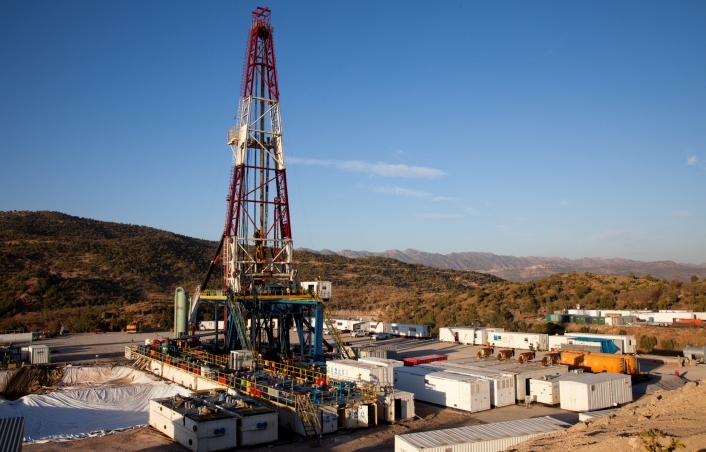
Cutting costs and opportunistic sales are at the heart of junior oil companies’ survival in Kurdistan, where exports have been offline since March 2023.
Executives from DNO, Genel Energy, Gulf Keystone Petroleum (GKP) and ShaMaran Petroleum were speaking this week at Pareto’s annual E&P conference.
None of the managers were willing to speculate about when the Iraq-Turkey pipeline may be back online. The link previously carried around 400,000 barrels per day of oil from Kurdistan and another 70,000 bpd of Iraqi crude.
GKP’s Jon Harris, noting the 10-month anniversary, said the pipeline had been out of action for “nine months and two weeks more than we thought it would take”.
Local demand
Unable to access export prices, the operators have turned to the local market and local refineries.
“Local sales have been up and down … I think some supplies from the KAR refinery were being diverted into northern Iraq and they’ve come back in November. That has led to barrel-on-barrel competition in Kurdistan,” Harris said.
“There’s also capacity constraints at refineries, around certain types of crude, there’s logistical constraints and there’s also the fact that we’re selling into an oligopoly marketplace.”
DNO’s Chris Spence expressed surprise at the amount of oil that the companies were able to sell into the local market. “It’s low pricing but it’s still a higher price than it costs us to produce the oil. We’d love to sell at Brent-like prices but we are still making a profit.”
ShaMaran CEO Garrett Soden said the status quo was good for the company. Its Sarsang licence is producing about 40,000 bpd, with oil going to the Lanaz refinery. Atrush is increasing from 10,000 bpd, with oil going to the KAR refinery.
High-level talks
The operators broadly expressed optimism about the outlook for tripartite talks. These are under way between the companies, the Kurdistan Regional Government and the federal government in Baghdad.
“We continue to see progress,” said Genel CFO Luke Clements. “It’s painfully slow. But it’s not like we’re close and then it all blows up. It’s just small steps, but with good progress.” Clements expressed confidence that Baghdad wanted Kurdistan to restart exports.
While the pipeline was the initial problem that disrupted exports, there are a number of additional factors. Iraq’s Supreme Court declared the KRG’s oil arrangements unconstitutional in 2022, throwing a shadow over contractual arrangements with the producing companies.
Furthermore, the KRG owes substantial debts to the producers for past production. GKP, for instance, is owed $150 million.
The oil companies have said they want progress on all these fronts before restarting operations.
Baghdad is eager to resume exports in order to earn revenues but also see the benefits of its arbitration award against Turkey. “The settlement is being drawn down because there’s a ‘ship-or-pay’ on the pipeline. They’re burning through it,” Harris said.
Cost cuts
In the meantime, companies have all cut costs. DNO’s Chris Spence said the company had moved quickly to pare back spending. Operational spending is down 65%, he said.
Production cost is “well under $10 per barrel, I think the last number is about $6”.
GKP has also cut costs, with Harris reporting opex at $3.2 per barrel. “It’s a great resource, we have an operating model that has a very low cost,” he noted. “It’s very competitive in Kurdistan and internationally.” In the first quarter of 2023, the company was spending $18mn per month. In the second half of 2023, it had cut this to $6mn.
The company cut costs by stopping contracts and shedding workers.
Genel, meanwhile, expects to have its spending covered by sales after the first quarter of this year, with a run rate of $3mn per month.
Next steps
“Despite the problems, we’re a long term partner. We believe these issues will be resolved,” Spence said. DNO is moving ahead with its commitment well on the Baeshiqa licence. This is the last well in the programme, with a gross cost of $18mn.
In response to the crisis, a number of the companies are thinking about M&A. DNO aims to build scale in the North Sea through purchases.
ShaMaran, meanwhile, is doubling down on its Kurdistan operations. The company struck a deal this week involving the Ross Perot-founded HKN Energy and Abu Dhabi’s TAQA. The latter exited, leaving the two smaller companies to it.
Kurdistan was “non core” to TAQA, Soden explained. “It took them seven months to sell locally” from the Atrush licence once the pipeline was closed, he said. HKN, on the other hand, “was very quick to go to local sales” from Sarsang.
Atrush is only selling oil locally through the pipeline, Soden explained. HKN “can go immediately to trucking. The first opportunity for a quick win would be HKN putting in trucking and doubling oil flows to maximise local sales and local price. We are growing our production by 50% and our 2P reserves by 30%. At no cost, plus an earn out.”
Clements noted that M&A for Genel was becoming harder. “When we started trying to do M&A, we had a big pile of cash and the bond maturity was quite a long way out. That’s not the case now.”
Genel’s bond matures in 2025. It has net cash of $115mn. “Even small-scale diversification of our business is a valuable thing to do, but the size is going to be less than we hoped. It’s not going to be as meaningful.”
One catalyst identified by Genel is an arbitration case it is pursuing in London against the KRG, on the Miran and Bina Bawi licences. “Our claim is that the cancellation … was repudiatory and because of that we’ve suffered significant losses. We’ve spent $1.4 billion of cash acquiring and investing in these licences.”

